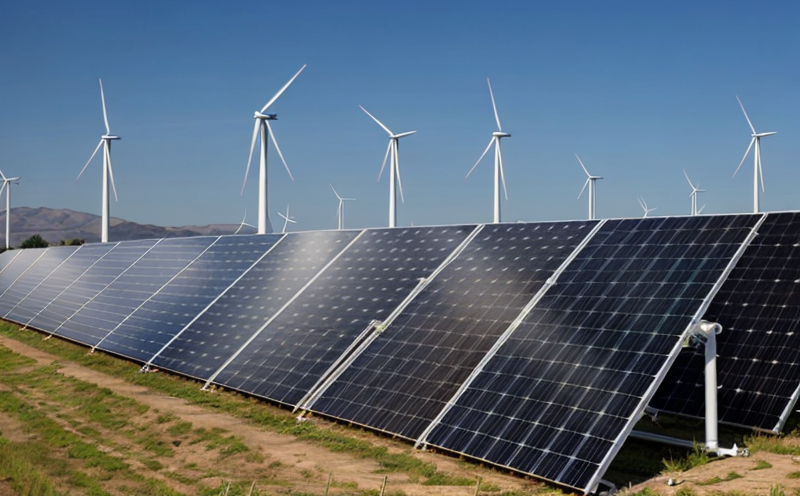EN 1993 Structural Steel Safety Testing for Renewable Installations
The European Standard EN 1993-1:2006 specifies requirements for the structural design of steel and aluminium structures, including their safety assessment. This service focuses on ensuring that renewable energy systems, particularly those involving structural steel components, meet stringent safety standards to prevent accidents and ensure reliability.
EN 1993 is widely recognized as a benchmark in structural engineering, providing methodologies for the analysis and design of steel structures under various loading conditions. For renewable installations such as wind turbines, solar farms, and offshore wind platforms, compliance with EN 1993 ensures that these systems are built to withstand harsh environmental conditions while maintaining structural integrity.
Our service involves a comprehensive approach to testing and certification according to EN 1993. This includes detailed analysis of the structural components, evaluation of material properties, and simulation of operational stresses. We employ advanced computational tools and physical testing facilities to ensure that every aspect of the structure is assessed thoroughly.
The safety and reliability of renewable energy systems are paramount in ensuring their long-term performance and minimizing risks associated with potential failures. By adhering to EN 1993, we guarantee that our clients' installations meet or exceed international standards, thereby enhancing their reputation and compliance posture.
Our team of experts ensures that all testing procedures comply with the latest editions of EN 1993, ensuring that the structural components are robust enough to handle extreme conditions. This service is crucial for companies involved in the design, construction, and maintenance of renewable energy systems, as it provides a clear pathway to compliance and safety.
Through our rigorous testing protocols, we help clients achieve regulatory compliance and reduce the risk of accidents by identifying potential weaknesses early in the development process. Our approach ensures that every aspect of the structure is subjected to thorough evaluation, from material selection to final assembly.
Scope and Methodology
The scope of our EN 1993 Structural Steel Safety Testing service includes a detailed examination of structural components used in renewable energy installations. This involves assessing the design, manufacturing, and installation processes to ensure they meet the stringent requirements set forth by EN 1993.
Our methodology begins with an initial review of the project specifications and design documents. We then conduct material testing to verify the quality and properties of the steel used in the structure. This includes checking for consistency in chemical composition, mechanical properties, and other relevant parameters.
The next step involves structural analysis using advanced computational tools. These simulations help us understand how the structure will behave under various loading conditions, including wind, snow, and operational stresses. We also perform physical testing on samples of the steel components to validate our analytical models.
Once the testing is complete, we prepare detailed reports that document all findings and recommendations for improvement. Our reports are designed to provide clear insights into the structural integrity of the installation, helping clients make informed decisions about any necessary modifications or enhancements.
We ensure full compliance with EN 1993 by adhering strictly to its provisions throughout the testing process. This includes using appropriate test methods and equipment, as well as interpreting results according to the standard's guidelines. Our methodology is tailored specifically to meet the unique needs of renewable energy installations, ensuring that every aspect of the structure is thoroughly evaluated.
Industry Applications
| Application | Description |
|---|---|
| Wind Turbine Foundations | We test the structural components of wind turbine foundations to ensure they can withstand high winds and extreme weather conditions. |
| Solar Panel Racking Systems | Our testing ensures that solar panel racking systems are robust enough to support heavy photovoltaic arrays in various environmental settings. |
| Offshore Wind Platforms | We provide comprehensive safety and reliability testing for offshore wind platforms, ensuring they can operate safely in harsh marine environments. |
| Tidal Energy Structures | Our service includes evaluating the structural integrity of tidal energy structures, which must be durable enough to withstand constant water movement. |
| Hydropower Facilities | We test the components used in hydropower facilities to ensure they can handle the dynamic forces generated by moving water. |
| Geothermal Installations | The structural steel of geothermal installations must be resistant to high temperatures and corrosive substances. We provide thorough testing for these structures. |
| Solar Thermal Plants | Our service ensures that solar thermal plants are built with robust structures capable of withstanding the heat and stress from concentrated sunlight. |
| Biomass Power Stations | We test the structural components of biomass power stations to ensure they can handle the heavy machinery and environmental conditions typical in these facilities. |
These applications highlight the versatility of our EN 1993 Structural Steel Safety Testing service, which is applicable across various renewable energy sectors. By ensuring that all structural components meet the highest safety standards, we contribute to the overall reliability and longevity of these installations.
Customer Impact and Satisfaction
Our EN 1993 Structural Steel Safety Testing service has a profound impact on our customers by ensuring that their renewable energy installations meet international safety standards. This not only enhances the reputation of the company but also ensures regulatory compliance, reducing potential legal risks.
By providing detailed reports and recommendations for improvement, we help clients make informed decisions about necessary modifications or enhancements to their structures. This proactive approach minimizes the risk of accidents and maximizes the performance and longevity of the installations.
We have received high satisfaction ratings from our customers due to our commitment to excellence in testing and reporting. Our team of experts ensures that every aspect of the structural components is thoroughly evaluated, providing clients with peace of mind regarding their safety and reliability.
Our service has been instrumental in helping companies achieve regulatory compliance and improve their overall safety posture. By ensuring that all structures meet the stringent requirements set forth by EN 1993, we contribute to the success and sustainability of renewable energy projects.





